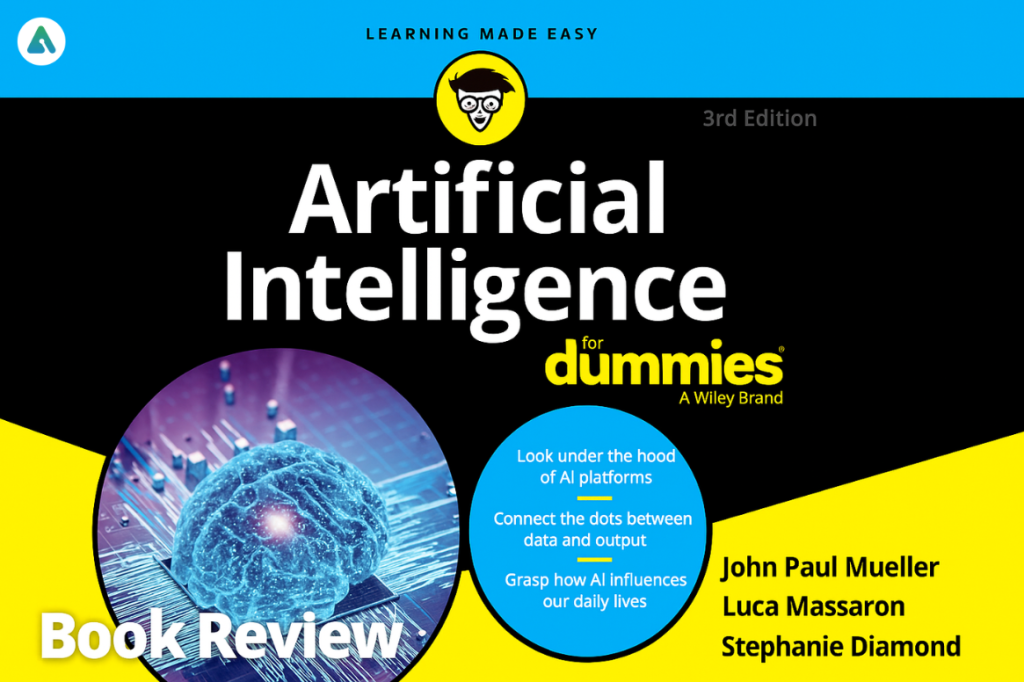Step aside, hype. John Paul Mueller’s Artificial Intelligence For Dummies is the book that makes sense of AI — for anyone who wants clarity over buzz.
Artificial intelligence is the new electricity, running through our digital veins — powering cars, curating feeds, and even ghostwriting half the internet. Yet for all the buzz, very few people truly understand it. Enter John Paul Mueller’s Artificial Intelligence For Dummies, a book that, in 2025, isn’t just relevant — it’s essential.
This isn’t a technical manual or a whitepaper. It’s a masterclass in clarity, a translation layer between humans and the algorithmic world we’re building. And paradoxically, the very simplicity that some might see as a “limitation” is its greatest strength.
AI Without the Hype: Mueller’s Core Achievement
Most AI books fall into two camps:
-
The Overpromisers, who hype superintelligence as if AGI will arrive tomorrow.
-
The Doomsayers, who see every dataset as a catastrophe in waiting.
Mueller stays grounded. He defines AI as the simulation of human cognitive processes — through data, logic, and pattern recognition — and insists on understanding limits as much as possibilities. Machines can outperform humans at recognition and optimization, but not at intuition or imagination. This distinction, often glossed over by “AI gurus,” is crystal clear here.
From Data to Consciousness: Seeing the Framework
Chapter three, “Defining Data’s Role in AI,” is where the book’s brilliance resonates. Mueller demonstrates that data is more than input — it carries context, ethics, and bias.
He dissects unstructured data (images, text, voice, behavior) and shows how its quality shapes intelligence. Bias isn’t a bug; it’s baked in. For anyone who’s seen how a mislabeled dataset can skew predictions, this insight feels eerily familiar — and profoundly important.
Algorithms: Philosophy in Motion
Mueller’s discussion of algorithms isn’t just technical; it’s philosophical. He explains planning algorithms, heuristics, and search trees — but his real point is that algorithms don’t solve problems, they frame them.
The “AI effect” — when every new AI stops being considered AI once it works — is highlighted brilliantly. It’s a reminder that every success in AI quickly becomes mundane, a lesson both professionals and enthusiasts need to remember.
Machine Learning and the Converging Tribes
Mueller introduces AI’s intellectual tribes: Symbologists, Connectionists, Evolutionaries, Bayesians, and Analogizers. Far from being historical trivia, this framework explains the convergence we see today — neural-symbolic hybrids, transformers with Bayesian underpinnings, and generative models redefining creativity.
Mueller foresaw this integration before it became mainstream. He provides context, not just facts, ensuring the reader understands why these ideas matter.
Deep Learning: Pattern, Not Perception
The deep learning chapters are elegant yet profound. Mueller explains perceptrons, convolutional networks, and backpropagation with simplicity — but his commentary elevates it:
“Deep learning doesn’t think — it detects patterns at scale.”
This separates fact from hype, reminding readers that breakthroughs like GPT are built on mathematical mimicry, not consciousness.
Generative AI: Principles Over Fads
Mueller’s treatment of Generative AI is prescient. Models like GPT and DALL·E aren’t novelties; they exemplify algorithmic creativity. While some texts chase the latest release, Mueller captures timeless principles: AI democratizes creation but also magnifies misinformation, copyright complexity, and identity challenges. He calls it “the automation of imagination” — a phrase as true for the next LLM as it is today.
Ethics: The Foundational Compass
The book’s ethical discussion is perfectly pitched. Rather than diving into abstract philosophy, Mueller equips readers with a stable framework: bias, data quality, and the human responsibility behind AI. This foundation allows readers to engage with advanced debates later — without getting lost.
Reframing “Boundaries” as Masterstrokes
-
No hands-on coding? This is a deliberate antidote to tutorial fatigue. Mueller skips ephemeral code to focus on timeless intellectual scaffolding, ensuring long-term relevance.
-
High-level perspective? Far from shallow, it’s distilled genius — a synthesis that accelerates understanding far faster than technical deep-dives.
-
Light on ethics/philosophy? The book gives the essential grounding needed before exploring complex abstractions.
-
Cutting-edge nuance in GenAI? Timeless principles always outweigh the ephemeral: Mueller teaches the why, not the fleeting what.
Every perceived “limitation” is in fact an intentional editorial choice that enhances the book’s intellectual longevity.
What Readers Are Saying on Amazon
Artificial Intelligence For Dummies has garnered praise for its accessibility and comprehensive overview of AI concepts. Readers appreciate its clear explanations of machine learning, deep learning, and robotics, making complex topics approachable for beginners. The book’s broad scope provides a solid foundation without overwhelming detail, and its readable style, often infused with humor, enhances the learning experience.
Some readers note that while the book is excellent for newcomers, it may feel basic for those seeking in-depth technical knowledge. Additionally, a few have mentioned that the embedded links within the text can disrupt the reading flow. However, these aspects are often viewed as intentional design choices to prioritize clarity and foundational understanding.
The Verdict: A Foundational Masterpiece
Artificial Intelligence For Dummies is no mere introduction. It is a paradigm-shifting essay on intelligence itself, readable, precise, and profoundly clarifying. Mueller strips away the ephemeral and focuses on the enduring principles that every student, developer, executive, and policymaker must grasp before venturing further into AI.
You don’t simply read this book; you carry its insights in your mind as the foundation for every conversation about AI. Not just a “For Dummies” book — it is the definitive, essential prerequisite for understanding the age of intelligence.
Visit: AIInsightsNews


